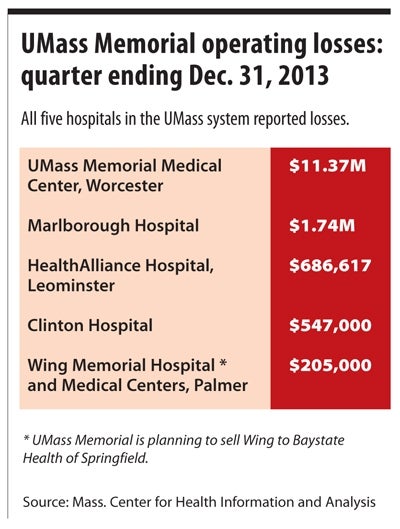History has proven time and again to be among the greatest teachers, especially in business. But one lesson that keeps repeating itself through history is that the only things you can count on are death, taxes and change.
Industry after industry is full of players who were on top of their game in one decade, only to struggle to survive later.
Today it’s the U.S. health care industry that’s engulfed in change that’s being felt throughout the country, and certainly quite acutely here in Central Massachusetts.
At the center of the action here, at least the one entity garnering the most attention, is UMass Memorial Health Care, the largest health care provider in the region and the largest employer in Central Massachusetts. Following a $55-million operating loss in its last fiscal year, which ended in September 2013, the losses at its five hospitals continued through the end of the year. (See accompanying chart.)
More recently, UMass Memorial announced it will cut more than 100 positions at its Worcester hospitals, and a few more at HealthAlliance Hospital in Leominster. Meanwhile, Moody’s Investors Service has downgraded the system’s credit rating, citing declining admission volumes and “constrained” revenue growth.
Yes, the times they are a changin’ for UMass Memorial, as well as the rest of the health care system.
The impetus behind much of this change, of course, is health care reform at both the state and federal levels, which is in the throes of trying to insure more Americans and help tamp down escalating costs. The federal government has already begun to cut into health care providers’ revenue by levying penalties for readmission of Medicare patients. We are seeing those sweeping changes come home to roost in our largest employment sector.
There will be more change, of course, as the remaining provisions of the Affordable Care Act take effect over the next few years, and they will impact all systems, but especially the larger entities such as UMass Memorial more significantly. As Rich Copp, vice president of communications at Boston-based Partners HealthCare, indicated recently in an interview with the WBJ, UMass Memorial is not alone. Copp said Partners lost $1.1 billion in federal and state reimbursements last year, 9 percent more than in 2012.
Eric Dickson, who has been UMass Memorial’s president and CEO for only 14 months, is in an unenviable position. But he hasn’t been reluctant to address the system’s challenges with the thousands of UMass Memorial employees.
Dickson has kept them informed of the many changes underway through his blog — not dodging the bad news — but putting the changes into context for the organization’s 10,000-plus employees. In a recent post he outlined his hopes to reduce last year’s operating loss in 2014 and eliminate it by 2015.
UMass Memorial has its critics, notably the Massachusetts Nurses Association, the union that represents the system’s nurses. But even its spokesman, David Schildmeier, told the WBJ recently that he’s hopeful Dickson will turn things around.
For the future vitality of the Central Massachusetts health care industry, all of the area’s leaders in the industry will need to navigate the seas of industrywide change with great skill. Keeping our position as a leader in high-quality health care delivery is an important priority for the region, and supporting our leading institutions as they retool for tomorrow is a top priority for all of us. n

